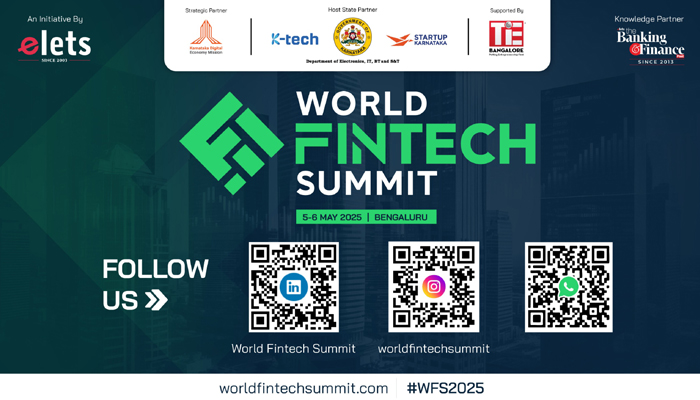
The Blockchain offers a potential to revolutionise the Fintech market by minimising role of the intermediaries and bringing in efficiency, however globally this is still in the pilot stage, says Sameer Dharap, Vice President, Blockchain Applications, XinFin -a Singapore-based Blockchain technology company, that recently launched its marketplace platform, ‘TradeFinex’ in India. In a conversation with Rakesh Roy of Elets News Network (ENN), he shares his views on the future technological paradigm shift in the digital transaction through Blockchain in detail.
Can you please throw more light on the TradeFinex platform that your company launched recently in India?
TradeFinex is a decentralised peer to peer marketplace platform, powered by XinFin hybrid Blockchain and its XDC01 protocol, which will bring together Governments, Institutions, Buyers and Suppliers. TradeFinex aims to minimise inefficiency in global trade and finance using Blockchain technology.
TradeFinex helps buyers secure capital at globally competitive rates, gives suppliers’ visibility on global tenders and customer base. It provides financiers real time visibility on their investments. This is enabled using Blockchain based escrow smart contracts, asset digitisation and Internet of Things (IoT) integration.
Buyers and Suppliers can drive bottom line benefits using XinFin Hybrid Blockchain smart contracts and peer to peer decentralised TradeFinex platform. Beneficiaries can post projects and connect with global suppliers. Suppliers can reach out to potential buyers and submit techno-commercial proposals on this platform. They can execute escrow based smart contracts with global beneficiaries over secure Blockchain network. The payments terms can be linked to customised smart contract milestones, triggered upon delivery of goods or services.
Beneficiaries and Financiers can drive bottom-line benefits using XinFin Hybrid Blockchain smart contracts and peer to peer decentralised TradeFinex platform. Beneficiaries can post financing requests on TradeFinex platform and reach out to global financiers. Financiers can evaluate projects and execute escrow based smart contracts with global beneficiaries over secured Blockchain network. The assets financed can be digitised over Blockchain and repayment can be linked to escrow smart contracts. The disbursement can be linked to customised smart contract milestones, triggered upon milestone completion.
Governments, Institutions and communities can raise finance, specifically for critical public infrastructure projects that the government needs to undertake for economic well-being of the citizens. Using TradeFinex platform, infrastructure projects can be undertaken without burdening government treasury. TradeFinex platform than can be used with existing laws of the land and payment rails or in an approved jurisdiction using XinFin’s underlying XDC tokens for cross border settlement.
How do you look at the Indian Market in terms of Blockchain technology adoption in various sectors? What are the potentials you foresee in India in this regard?
In India, Blockchain Technology is often confused to Cryptocurrency (like Bitcoin). The government has recently made it clear that the VCs (Virtual Currencies or cryptocurrency) are not legal tender and such VCs do not have any regulatory permission or protection in India. However Blockchain Technology and Cryptocurrency are two different things.
Globally, Blockchain technology is still in nascent stage. Most of the organisations and governments are still exploring how this technology can be utilised. The government of Andhra Pradesh under leadership of N. Chandrababu Naidu has been leading the journey in to the Blockchain and Digital technology. The state has launched pilot projects in land records and transportation. A start-up ecosystem is being set-up in Vizag and this is just the beginning. The efforts are being supported by KPMG, TCS, Infosys and other leading financial institutions. Banks are equally active in Blockchain space and several use cases are being conceptualised.
Traditionally our processes have been paper and manual authorisation based. Our Prime Minister Shri. Narendra Modi has launched Digital India campaign to ensure that Government services are made available to citizens electronically by improved online infrastructure and by increasing Internet connectivity or by making the country digitally empowered in the field of technology. Roll-out of Blockchain solutions will boost Digital India drive. Mobile phone penetration in India is set to rise to from the current levels of 65-75 per cent to 85-90 per cent by 2020. This coupled with digital solutions will cut down processing costs and delays and potential in a country like India is enormous. Solutions can be deployed across the sectors and government services, financial institutions, capital markets, trade and finance will see the biggest benefits.
How has Blockchain Technology evolved in the Fintech revolution in the last few years?
Fintech revolution in India can be attributed to rise of Paytm in last few years. They have rewritten the rules of the game using a simple wallet solution. All cryptocurrencies have a similar wallet solution, which is cross border and globally accepted. This will lead next round of global Fintech revolution.
Blockchain technology has come to light due to exponential growth in the price of cryptocurrencies. The market cap of all cryptocurrencies rose from USD 20 billion at the start of 2017 to $ 750 Billion by end of 2017. The market valuation is speculation driven and there is no underlying intrinsic value in these cryptocurrencies. The Blockchain offers a potential to revolutionise the Fintech market by minimising role of the intermediaries and bringing in efficiency, however globally this is still in the pilot stage. There are no proven cases of a production ready systems, this will evolve in coming years.
How is Blockchain technology important in terms of Cyber security in the financial systems?
Cyber security is an important element of Blockchain technology. In this digital era, all transactions are digital and funds are stored in e-wallets. Any unauthorised access to wallet will lead to loss of funds. The unauthorised access can be obtained by compromised login credentials or loss of private keys to the wallet where funds are stored. This can happen due to the attacks or leaks run through the exchanges/wallets, where private keys are stored.
Blockchain technology is built on Distributed Ledger. Any changes made to the ledger are immutable and cannot be reversed. This leaves a strong trail of transactions that can be traced and audited. While making simultaneous changes to all copies of shared ledger is difficult, loss of funds is still an area of concern. In past there have been numerous incidents of loss of funds and unfortunately there is no standard solution. Global nature of wallets makes it difficult for authorities to identify, track and enforce regulations pertaining to thefts.
Looking at the explosive growth in digital payments in India, what are your future plans for your business growth in the country?
We have recently inaugurated our TradeFinex platform, a peer to peer commerce platform to improve efficiency in trade and finance. Our focus is MSME sector where access to capital is cited as the biggest challenge. Using TradeFinex platform, we aim to reduce cost of commerce to a fraction and empower this user segment.
We are initiating global tie-ups with leading trade associations and industries. We aim to bring them on this global platform and financial institutions shall follow soon. We are in the process of configuring INR as a payment rail on our platform in order to be compliant with local laws of the land. We aim to facilitate $ 100 million worth of commerce using our platform in 2018-19.
Elets The Banking and Finance Post Magazine has carved out a niche for itself in the crowded market with exclusive & unique content. Get in-depth insights on trend-setting innovations & transformation in the BFSI sector. Best offers for Print + Digital issues! Subscribe here➔ www.eletsonline.com/subscription/




















